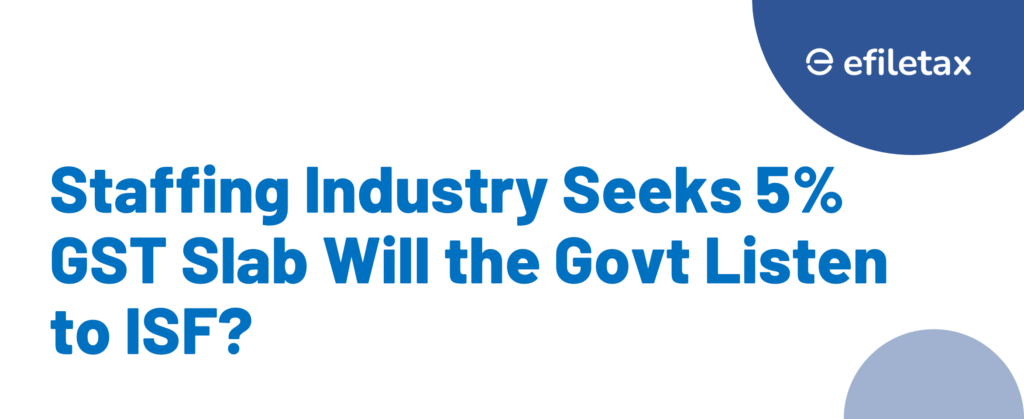
GST on Staffing Services: Industry Push for 5% Slab Explained
The GST on staffing services has come under spotlight after the Indian Staffing Federation (ISF) urged the finance ministry to reduce the current GST rate from 18% to 5%. This demand is not just about tax—it’s about boosting formal employment, lowering hiring costs, and improving ease of doing business for India’s ₹60,000 crore staffing industry.
Let’s break down what’s happening, why it matters, and how a GST rate cut could reshape India’s labour market.
What Are Staffing Services Under GST?
Staffing services include:
- Temporary staffing
- Contractual employment
- Payroll outsourcing
- Recruitment and manpower supply
As per Notification No. 11/2017-Central Tax (Rate) dated 28.06.2017, these services currently attract 18% GST under SAC 9985/9986.
ISF’s Request: Why the 5% GST Slab?
The Indian Staffing Federation (ISF)—a key body representing organised staffing companies—has submitted a proposal to the Department of Revenue seeking a reduction in GST on staffing services to 5%, similar to essential services like job work in textile or food processing.
Reasons cited:
- Reduce dual tax burden: Principal employers also pay GST on final services rendered, leading to cascading.
- Encourage formal hiring: Lowering GST will reduce hiring costs for MSMEs and startups.
- Align with global best practices: Many countries do not tax employment services at high rates.
- Ease industry cash flows: With tight working capital cycles, 18% output tax adds major cost pressures.
Current GST vs Proposed: Quick Comparison
| Particulars | Current Rate | Proposed Rate |
|---|---|---|
| GST on manpower supply | 18% | 5% |
| ITC available? | Yes | Yes (assumed) |
| Impact on employer cost | High | Lower hiring costs |
Legal View: Can the GST Council Act on This?
Under Article 279A of the Constitution, the GST Council has power to recommend changes in tax rates.
In the past, the Council has revised GST for sectors based on industry representations—such as education, insurance, and job work.
For staffing, the council may examine:
- Revenue impact of rate reduction
- Employment multiplier effect
- Risk of misuse or classification disputes
So while legally feasible, it requires balancing fiscal and labour priorities.
Expert Insight: How This Impacts You
“For startups, staffing costs are one of the biggest monthly outflows. A reduced GST would directly ease payroll outsourcing costs and increase formalisation,” says a CA who handles compliance for multiple mid-sized firms.
Even small CA firms hiring on contract basis or startups using gig workers may benefit if the GST slab drops.
CBIC Clarification So Far?
The CBIC has not yet issued a clarification or circular on the ISF request. However, in earlier Circular No. 190/02/2023-GST, it clarified service classification issues in manpower contracts—highlighting ongoing confusion in the sector.
Possible Next Steps
If accepted, a rate cut could be announced in:
- Next GST Council Meeting
- Union Budget 2025 (if not decided earlier)
Taxpayers and HR consultancies should track CBIC site: https://cbic-gst.gov.in for any official notification.
What Should Employers Do Now?
- Budget conservatively at 18% until notified
- Review contracts for staffing service clauses
- Document ITC chain in case of scrutiny
- Consult your CA before reclassifying services
Summary
ISF urges the government to lower GST on staffing services from 18% to 5% to boost formal hiring and reduce employer burden. Here’s what it means.
FAQs on GST for Staffing Services
Q1. What is the current GST rate on staffing or manpower supply services?
18% under SAC 9985/9986 as per Notification 11/2017-CT (Rate).
Q2. Can ITC be claimed on GST paid for staffing services?
Yes, provided it’s used for business purposes and not blocked under Section 17(5).
Q3. Will GST rate cut apply retrospectively?
No, any reduction will apply prospectively post-notification.
Q4. Does it affect freelancers and gig workers?
Only if services are through registered staffing agencies. Individual freelancers may fall under different tax brackets.
Conclusion
The demand to lower GST on staffing services to 5% is gaining traction. Whether you’re a business outsourcing your workforce or a staffing agency, this change—if accepted—can reduce costs and increase formal hiring. For now, stay compliant, track updates, and let Efiletax handle your GST filings and contracts with ease.